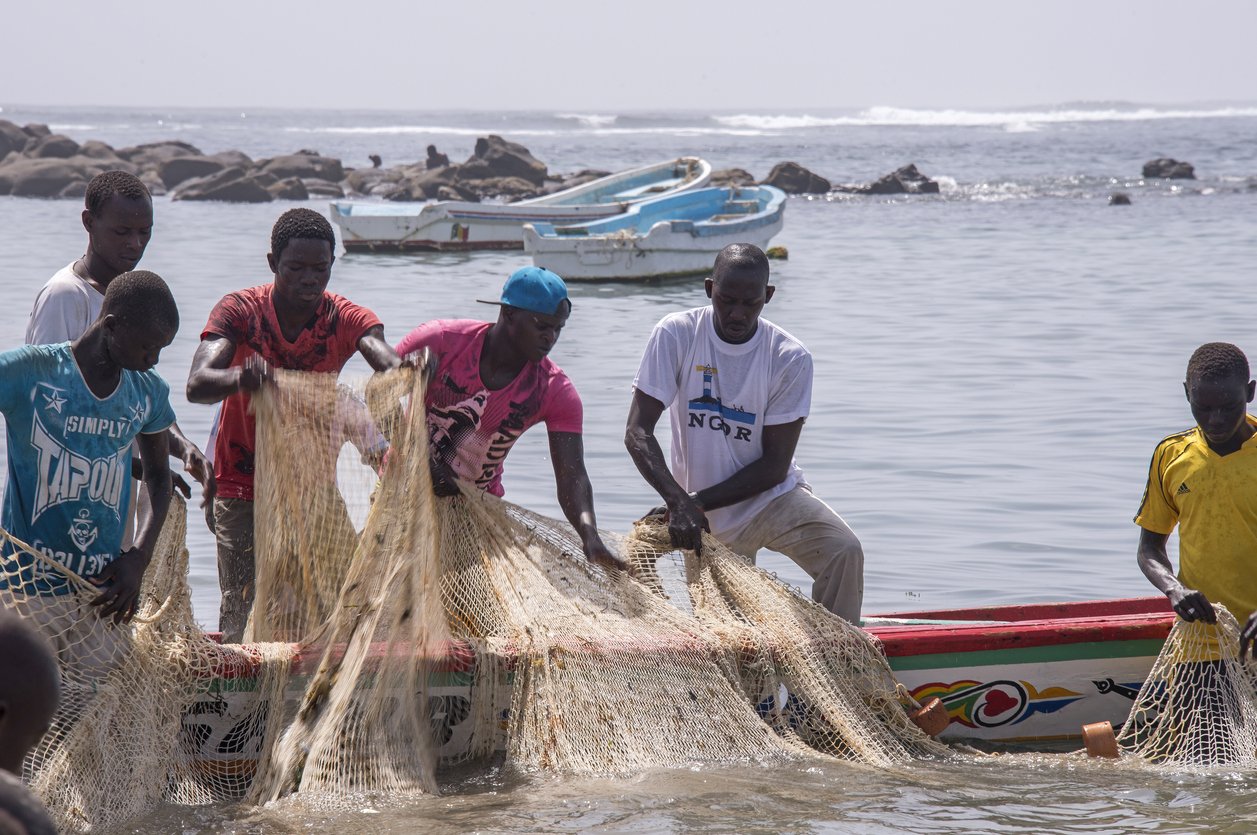Background
Labor abuse and illegal, unreported, and unregulated (IUU) fishing are undermining the social and environmental sustainability of fisheries, with wide-ranging impacts including the loss of individual human rights and nutritional and economic benefits to fishing communities and governments. Studies indicate that 20-40% of illegally caught fish worldwide comes from West African waters, with IUU fishing accounting for regional economic losses valued at USD9.4 billion annually. It is also a significant driver of fish stocks overexploitation.
Through work undertaken as part of Task Force 1, addressing labor abuse and IUU fishing is central to SeaBOS’ mission to lead a global transformation towards sustainable seafood production and a healthy ocean. This ambition requires science-informed action across company supply chains and long-term collaborations with a diversity of stakeholders to address regional and local challenges.
The West Coast Africa Keystone Project is designed to understand IUU fishing and modern slavery risks within SeaBOS member companies’ own operations and across their supply chains. Together with regional partners SeaBOS members will then work to design and implement actions that effectively mitigate these risks.
The West Coast Africa Keystone Project will focus specifically on the supply chains of small pelagic fish in the coastal waters of Mauritania and Morocco, tuna fisheries and their supply chains in FAO area 34 and Senegal, and octopus fisheries in Morocco and Mauritania.
The project will enable synergies with existing efforts and partners active in the region. It will contribute to illuminating existing challenges, while also developing and implementing solutions, and evaluating their effectiveness.
The aim is to create positive, tangible, and publicly reported impacts by October 2025. The approach taken and solutions developed are intended to be adaptable and scalable to other fisheries and/or regions.
SeaBOS members, in collaboration with their scientific partners and regional actors will use a collaborative approach to ensure SeaBOS members have mechanisms in place that minimize, and due diligence measures that mitigate, IUU fishing and modern slavery risks across their small pelagic fisheries, tuna, and octopus supply chains off the west coast of Africa.
Project objectives
Means to achieve these objectives will include:
- Applying and adapting the evidence-based risk framework developed by the Stanford Center for Ocean Solutions to identify risks across supply chains.
- Designing and implementing due diligence measures to help eliminate IUU fishing and modern slavery risks from SeaBOS members´ supply chains.
- Developing approaches, tools and measures that can be adapted to and used in other regions.
- Contributing and adding to existing initiatives currently taking place in the region.
Why this project?
- Demonstrate ocean stewardship and leadership in a region identified at high risk of IUU fishing and modern slavery. Fisheries products from the West coast of Africa are globally traded, of local social, ecological, and economic significance, and are of critical importance for sustainable sourcing of seafood and marine ingredients.
- Advocate for and support the development of sustainable fisheries management and human rights due diligence in the region, leveraging partnerships.
- Develop a framework and approaches to address risk of IUU fishing and modern slavery that can be scaled to other regions and/or supply chains.
- Support delivery on SeaBOS time bound goals and commitments.
Who will we work with to achieve results?
SeaBOS member companies and scientists will work with national governments, civil society organisations, Fisheries Improvement Projects (FIPs), human rights groups and others to co-develop approaches and implement actions – ensuring that outcomes are achievable and scalable.
Industry leadership team:
- Hiroyuki Sato, Toshihiko Yamaguchi, Asami Zenimura (Maruha Nichiro)
- Patrick Shin, Sang-Jin Park, James Kim (Dongwon)
- Dave Robb, Taylor Voorhees (Cargill)
- Jorge Diaz Salinas (Skretting Nutreco)
Science team:
- Dr. Colette Wabnitz, Stanford Centre for Ocean Solutions (science team focal point)
- Dr. Liz Selig, Stanford Centre for Ocean Solutions
- Dr. Jan Bebbington, The Pentland Centre for Sustainability in Business, Lancaster University

